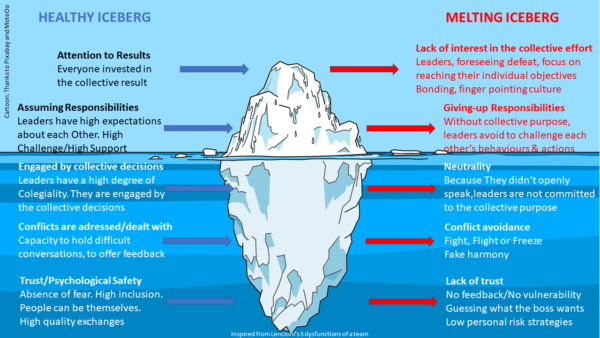Almost twelve years ago, a client and friend, Beat Blaesi (Leadership Development Director at Bank Julius Baer at the time) introduced me to Patrick Lencioni’s “Five Dysfunctions of a team” and I shared its model with you, in an article.
I now regularly work (I should say “I enjoy myself”) with a Brazilian company, called iFood. The company is active in a similar field than UberEATS, Just eat or Deliveroo. What makes them different, is an uncompromising base of values, which means that, no matter how good you are at reaching your objectives, you will not feel good there, should you not “walk the talk”. The second particularity of iFood is to be a truly disruptive organism, continuously challenging business orthodoxies, reinventing itself and expecting its people to grow and develop themselves.
During a peer coaching exercise, I was asked to rework and adapt Lencioni’s model to the Disruption Economy, which gave me a chance to be reminded of how rich it is and that it retains its full validity in the Disruption Economy. I have redrawn Lencioni’s model (originally pyramidal) as an iceberg where the basis, maintaining the iceberg stable is deeply concealed underwater and not visible. Business Results and Accountability are the visible part of the iceberg.
Starting from the bottom:
- Trust and Psychological Safety: They are the “make it or break it” of the Disruption Economy. The speed requested nowadays means that the old debate on “Should Trust be earned or given” is over. Trust has to be built and given. And, as we all know by now, there are numerous studies (the most popular being Google’s “Aristoteles Project”) showing how Psychological Safety, and the absence of fear it suggests, enhances creativity and lays the bed of collective intelligence and shared purpose. This is fundamental in the Disruption Economy.
- Addressing conflicts and dealing with issues: The Disruption Economy, with the increased importance of technology, knowledge and working remotely has rendered transparency, clarity and relationships absolutely fundamental. I am curious to know how many of us have experienced the “walking on a tight rope” feeling that working at a distance created for our difficult conversations… When working with very bright people, in a difficult “remote” context, with not always helpful technologies (victims of Zoom, Microsoft teams, etc. please raise your hand) you must create a climate where issues and conflicts are put on table and dealt with.
- Leaders engaged by collective decisions: Professional people usually accept when their ideas are not withheld by the team, as long as they feel they were met with respect and given a fair chance. Engagement is the result of shared purpose and mutual respect. The recent articles “starring” Michael Sandel show what happens to the collectivity when people feel disrespected…
- Assuming responsibilities: As some of you know, sports (mainly ice hockey and football/soccer) have always fascinated me. One particular instance takes place when, disappointed by their team’s collective performance, the star believes it to be their duty to shine and score alone after a superb solo dribbling scene… Unfortunately, this may happen in their dreams but rarely in reality. When their team struggles, I often see the star miserably crash in flame in their heroic and individual effort to save them. The same happens in business teams, although the “stars” aim may not be to save the organisation but rather save themselves. And that is where bonding (internal competition, alpha male competition) starts to emerge, spreading like a lethal cancer to the whole organisation. Successful icebergs see their leaders work together, not losing sight of the collective aim. They are willing to sacrifice immediate success, or their own silo or temporary glory for the benefit of the community.
- Collective attention to results: This is the ultimate stage of success. In that culture, leaders behave like members of a partnership, positively minding each other businesses, asking difficult questions, addressing underperformance. There is no room for ego, selfishness nor politics. Generosity, intelligence, purpose are the trademarks of such organisations.
As an illustration, here are two examples, dating before the Disruption Economy, that display so well what flourishing communities can produce as a result:
Brasil 1970 football team, probably the best of all times:
And the Alegria of Franco Dragone (Cirque du Soleil), both operating intuitively under Lencioni’s principles.
I wish you to work with/built such vibrant communities.




0 Comments